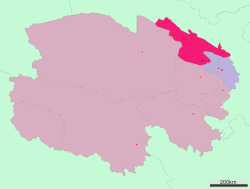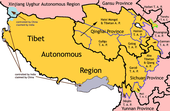| Revision as of 12:24, 18 August 2023 editWOSlinker (talk | contribs)Administrators854,737 edits →Demographics: wikitable← Previous edit | Latest revision as of 11:12, 6 March 2024 edit undoAchmad Rachmani (talk | contribs)Extended confirmed users83,079 edits →top: Altered date. | ||
| (One intermediate revision by one other user not shown) | |||
| Line 74: | Line 74: | ||
| |unit_pref = <!--Enter: Imperial, to display imperial before metric--> | |unit_pref = <!--Enter: Imperial, to display imperial before metric--> | ||
| |area_footnotes = | |area_footnotes = | ||
| |area_total_km2 = <!-- ALL fields with measurements are subject to automatic unit conversion--> | |area_total_km2 = 33350<!-- ALL fields with measurements are subject to automatic unit conversion--> | ||
| |area_land_km2 = <!--See table @ Template:Infobox Settlement for details on unit conversion--> | |area_land_km2 = <!--See table @ Template:Infobox Settlement for details on unit conversion--> | ||
| |area_water_km2 = | |area_water_km2 = | ||
| Line 91: | Line 91: | ||
| |elevation_min_ft = | |elevation_min_ft = | ||
| <!-- Population ------------------------> | <!-- Population ------------------------> | ||
| |population_as_of = | |population_as_of = 2010 | ||
| |population_footnotes = | |population_footnotes = | ||
| |population_note = | |population_note = | ||
| |population_total = | |population_total = 273304 | ||
| |population_density_km2 = auto<!-- For automatic calculation, any density field may contain: auto --> | |population_density_km2 = auto<!-- For automatic calculation, any density field may contain: auto --> | ||
| |population_metro = | |population_metro = | ||
| Line 103: | Line 103: | ||
| |population_blank1 = | |population_blank1 = | ||
| |population_density_blank1_km2 = | |population_density_blank1_km2 = | ||
| | demographics_type2 = GDP<ref>{{cite book |author=青海省统计局、国家统计局青海调查总队 |title=《青海统计年鉴-2016》 |date=August 2016 |publisher=中国统计出版社 |isbn=978-7-5037-7834-6 |url=http://www.qhtjj.gov.cn/nj/2016/indexch.htm |access-date=2017-06-05 |archive-date=2017-12-28 |archive-url=https://web.archive.org/web/20171228012718/http://www.qhtjj.gov.cn/nj/2016/indexch.htm }}</ref> | |||
| | demographics2_title1 = Total | |||
| | demographics2_info1 = ] 9.5 billion<br />] 1.5 billion | |||
| | demographics2_title2 = Per capita | |||
| | demographics2_info2 = CN¥ 34,122<br />US$ 5,479 | |||
| <!-- General information ---------------> | <!-- General information ---------------> | ||
| |timezone = ] | |timezone = ] | ||
| Line 129: | Line 134: | ||
| }} | }} | ||
| '''Haibei Tibetan Autonomous Prefecture''' ({{zh|c=海北藏族自治州}}; {{bo|t=མཚོ་བྱང་བོད་རིགས་རང་སྐྱོང་ཁུལ་}}, {{bo|<big>t=མཚོ་བྱང་བོད་རིགས་རང་སྐྱོང་ཁུལ་</big>|w=mtsho-byang bod-rigs rang-skyong-khul}}, ]: ''cojang poirig ranggyong kü'') is an ] of northeastern ], China. The prefecture has an area of {{convert|39354|km2}} and its seat is ]. Its name literally means "north of ]." This Tibetan culture area was incorporated into Qinghai province in the early 1950s, as it lies distant from the ].<ref>{{Cite book |last=Norbu |first=Dawa |url=https://books.google.com/books?id=EGqyIgOlUCIC |title=China's Tibet Policy |date=2001-09-27 |publisher=Routledge |isbn=978-1-136-79793-4 |pages=244 |language=en}}</ref> |
'''Haibei Tibetan Autonomous Prefecture''' ({{zh|c=海北藏族自治州}}; {{bo|t=མཚོ་བྱང་བོད་རིགས་རང་སྐྱོང་ཁུལ་}}, {{bo|<big>t=མཚོ་བྱང་བོད་རིགས་རང་སྐྱོང་ཁུལ་</big>|w=mtsho-byang bod-rigs rang-skyong-khul}}, ]: ''cojang poirig ranggyong kü'') is an ] of northeastern ], China. The prefecture has an area of {{convert|39354|km2}} and its seat is ]. Its name literally means "north of ]." This Tibetan culture area was incorporated into Qinghai province in the early 1950s, as it lies distant from the ].<ref>{{Cite book |last=Norbu |first=Dawa |url=https://books.google.com/books?id=EGqyIgOlUCIC |title=China's Tibet Policy |date=2001-09-27 |publisher=Routledge |isbn=978-1-136-79793-4 |pages=244 |language=en}}</ref> | ||
| ==Demographics== | ==Demographics== | ||
Latest revision as of 11:12, 6 March 2024
| This article needs additional citations for verification. Please help improve this article by adding citations to reliable sources. Unsourced material may be challenged and removed. Find sources: "Haibei Tibetan Autonomous Prefecture" – news · newspapers · books · scholar · JSTOR (April 2023) (Learn how and when to remove this message) |
| Haibei Prefecture 海北州 · མཚོ་བྱང་ཁུལ། | |
|---|---|
| Autonomous prefecture | |
| Haibei Tibetan Autonomous Prefecture 海北藏族自治州 · མཚོ་བྱང་བོད་རིགས་རང་སྐྱོང་ཁུལ | |
 Qilian Mountains Qilian Mountains | |
 Location of Haibei Prefecture in Qinghai Location of Haibei Prefecture in Qinghai | |
| Country | People's Republic of China |
| Province | Qinghai |
| Prefecture seat | Haiyan County (Xihai) |
| Area | |
| • Total | 33,350 km (12,880 sq mi) |
| Population | |
| • Total | 273,304 |
| • Density | 8.2/km (21/sq mi) |
| GDP | |
| • Total | CN¥ 9.5 billion US$ 1.5 billion |
| • Per capita | CN¥ 34,122 US$ 5,479 |
| Time zone | UTC+8 (China Standard) |
| ISO 3166 code | CN-QH-22 |
| Haibei Tibetan Autonomous Prefecture | |||||||
|---|---|---|---|---|---|---|---|
| Chinese name | |||||||
| Chinese | 海北藏族自治州 | ||||||
| |||||||
| Tibetan name | |||||||
| Tibetan | མཚོ་བྱང་བོད་རིགས་རང་སྐྱོང་ཁུལ | ||||||
| |||||||
Haibei Tibetan Autonomous Prefecture (Chinese: 海北藏族自治州; Tibetan: མཚོ་བྱང་བོད་རིགས་རང་སྐྱོང་ཁུལ་, Wylie: mtsho-byang bod-rigs rang-skyong-khul, Tib.pin.: cojang poirig ranggyong kü) is an autonomous prefecture of northeastern Qinghai Province, China. The prefecture has an area of 39,354 square kilometres (15,195 sq mi) and its seat is Haiyan County. Its name literally means "north of Qinghai Lake." This Tibetan culture area was incorporated into Qinghai province in the early 1950s, as it lies distant from the Tibet Autonomous Region.
Demographics
According to the 2000 census, Haibei had 258,922 inhabitants with a population density of 6.58 inhabitants/km.
The following is a list of ethnic groups in the prefecture, as of the 2000 census.
| Ethnicity | Population | Percentage |
|---|---|---|
| Han | 94,841 | 36.63% |
| Hui | 79,190 | 30.58% |
| Tibetan | 62,520 | 24.15% |
| Mongol | 13,087 | 5.05% |
| Tu/Monguor | 7,806 | 3.01% |
| Salar | 901 | 0.35% |
| Others | 577 | 0.23% |
Subdivisions
The prefecture is subdivided into 4 county-level divisions: 3 counties, and 1 autonomous county:
| Map | ||||||||
|---|---|---|---|---|---|---|---|---|
 Menyuan
MenyuanCounty Qilian County Haiyan County Gangcha County | ||||||||
| Name | Hanzi | Hanyu Pinyin | Tibetan | Wylie Tibetan Pinyin |
Population (2010 Census) |
Area (km) | Density (/km) | |
| Haiyan County | 海晏县 | Hǎiyàn Xiàn | ཧའེ་ཡན་རྫོང་ | ha'e yan rdzong Ha'êyan Zong |
37,788 | 4,348 | 8.69 | |
| Qilian County | 祁连县 | Qílián Xiàn | ཆི་ལེན་རྫོང་ | chi len rdzong Qilên Zong |
46,473 | 15,610 | 2.97 | |
| Gangca County (Gangcha County) |
刚察县 | Gāngchá Xiàn | རྐང་ཚ་རྫོང་ | rkang tsha rdzong Gangca Zong |
41,333 | 12,500 | 3.30 | |
| Menyuan Hui Autonomous County | 门源回族自治县 | Ményuán Huízú Zìzhìxiàn |
མོང་ཡོན་ཧུའེ་རིགས་རང་སྐྱོང་རྫོང་ | mong yon hu'e rigs rang skyong rdzong Mongyoin Hu'êrig Ranggyong Zong |
147,710 | 6,896 | 21.41 | |
References
- 青海省统计局、国家统计局青海调查总队 (August 2016). 《青海统计年鉴-2016》. 中国统计出版社. ISBN 978-7-5037-7834-6. Archived from the original on 2017-12-28. Retrieved 2017-06-05.
- Norbu, Dawa (2001-09-27). China's Tibet Policy. Routledge. p. 244. ISBN 978-1-136-79793-4.
| County-level divisions of Qinghai Province | |||||||||||||
|---|---|---|---|---|---|---|---|---|---|---|---|---|---|
| Prefecture-level cities |
| ||||||||||||
| Autonomous prefectures |
| ||||||||||||
| |||||||||||||
| Tibetan-designated autonomous areas in China | |||||||||
|---|---|---|---|---|---|---|---|---|---|
| Regions |
|  | |||||||
| Prefectures and counties |
| ||||||||
36°57′N 100°54′E / 36.95°N 100.90°E / 36.95; 100.90
Categories: